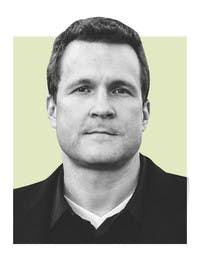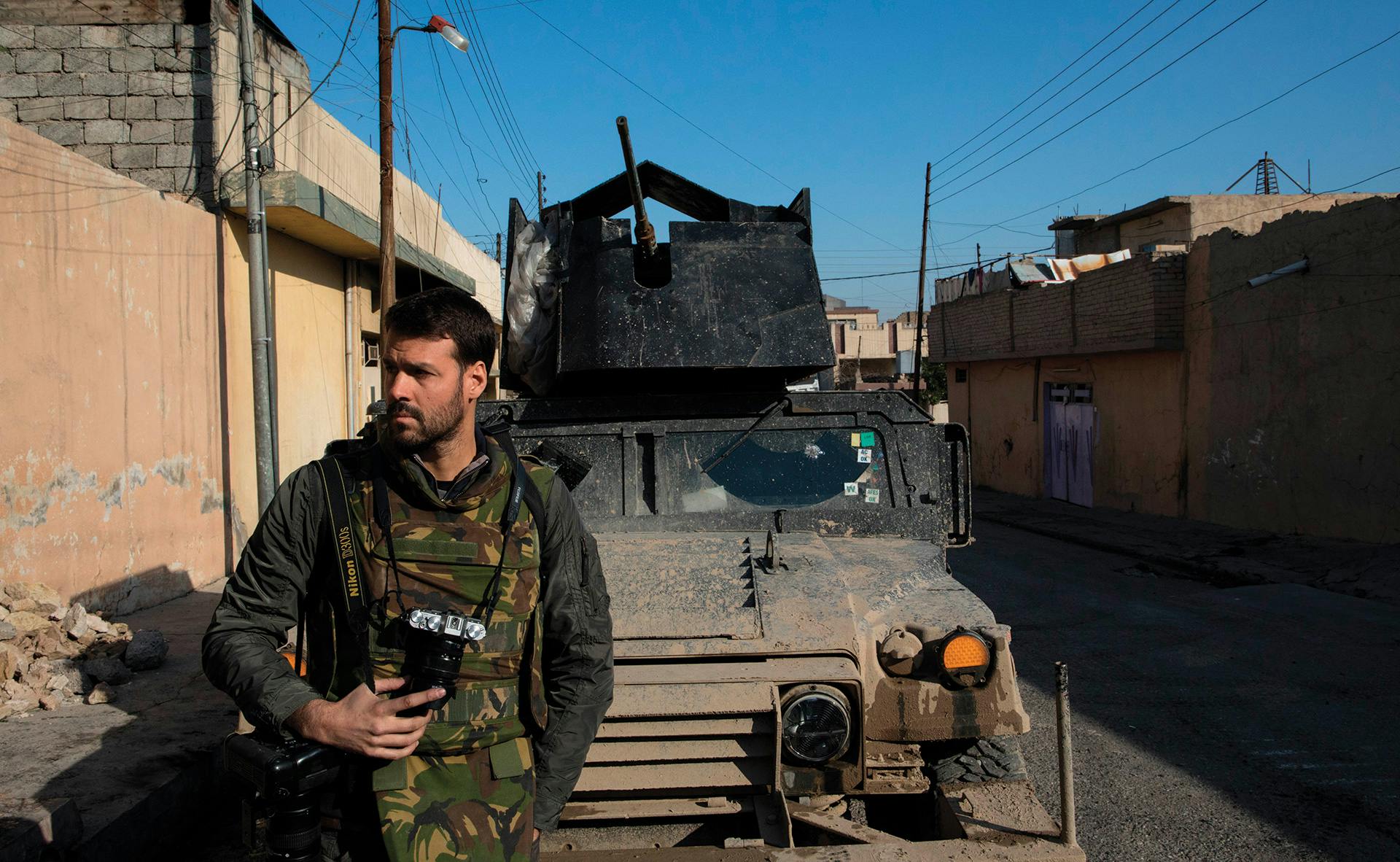Born in France and raised in the United States, Jonathan Alpeyrie began working as a photojournalist while still in college. He began to travel on international assignment, and he was drawn to taking pictures in regions wracked with war, eventually working in over thirty countries and more than a dozen conflicts. In 2013, he was captured in Syria by rebel forces and held hostage for 81 days, where he was handcuffed, blindfolded, starved, and beaten. As he recounted in The Shattered Lens: A War Photographer's True Story of Captivity and Survival in Syria, Alpeyrie was only freed when a Syrian businessman reportedly paid his ransom to curry favor with European and American authorities. Upon his release, Alpeyrie went right back to work photographing warfare and its aftermath.
What motivated you to report from conflict zones?
Different things. One goes all the way back to my childhood, where I was very close to my grandparents and great-uncles, and all of them fought in World War II. These stories I would hear as a child made quite an impressed, curious, permanent impression on my brain. That interest in war—being a young boy, an interest fighting and conflict comes naturally for us. So I read a lot of war history, made dioramas, painted model airplanes—huge nerd. My father used to read to me on Sunday nights before he sent me to school on Monday. War stories, Jack London, The Last of the Mohicans. Those great classics that continued to increase my interest.
Once you started getting into photography as an adult, what drew you to photographing conflict?
Photography was the medium for me to go into conflict. When I was a teenager, I wanted to go to West Point and be an officer. Turns out I'm not the best at taking orders, as I was always very independent. I did archaeology camps in high school, which I thought was interesting but not exciting enough. So war was always my calling, and I knew it, and photography was a perfect link that would connect who I am as an individual and being able to go to war.
Have your reasons or rationales for reporting on conflict changed or evolved over the years?
Yes. I've covered 13 wars, so I've been very active and proficient in the war photography business. Of course at first when you start, it has a lot to do with the excitement of things, being young and running around like a rabbit. You become more somber with time, as life often does, especially when you go through a lot of these difficult experiences. My career started going upwards rapidly when Getty Images picked me up in 2004. By that time I had a very clear consciousness in terms of where my career was supposed to be.
Would you say your experience of being held captive in Syria differs from the versions of such experiences we often see in pop culture?
The first thing that comes to mind when you're kidnapped is you always make sure that you're very docile, and very polite, very malleable, so you don't create any further physical or mental problems for yourself. If you resist, or revolt, or try something, you might get killed. In movies you see the guys as being all tough. It usually doesn't happen like that when you're scared and you don't want to die. Especially when your captors do a mock execution or torture, which I went through, and others did too. You want your captors to see you as a nice person and not a threat. You know, you do want to kill them sometimes, and it does cross your mind to do something, but if you're a rational person you don't. The notion of courage you see in movies, where you spit in the guy's face . . . you might just get killed.
You've spoken about how others who report on conflict sometimes miss or omit important context or background. How can that problem be avoided?
People have a very poor sense of history, and history is a crucial aspect to understand how things are today, and how they might be. The historical rules of human interaction, in terms of how one nation-state behaves toward another, still apply today. I think the media spends too much time focusing on details instead of focusing on the macro understanding of things. If you do have this historical sense, you become more neutral, as journalists need to be, without passing judgments, or criticizing, or saying this is right, this is wrong. Sure, war is wrong, we all know that, and water is wet, and snow is cold. These are obvious things. So it's not interesting to argue about that. What's interesting is to try to understand why conflicts do happen, why they happen more in some areas, like the Levant, for example. Try to understand the historical connotations. Once you have a global understanding, you can go into the details. Instead the media only goes into the details first, and so most people don't have the time or education to see what's happening, and it's confusing for everybody. So you start from big, and then you go smaller, and then you could go to individual stories.
Is it different working for these large photo agencies like Getty and Polaris versus shooting for specific publications?
Yes it is. I shot for SIPA, Polaris, and Getty, but the past few years I've been putting some distance between myself and my agencies. Vanity Fair, Elle, CNN . . . I shot for pretty much everybody. I like having direct contact with editors . . . there's more of a personal feel to it. The problem with photo agencies today is that they just don't have any money anymore, the traditional ones, that is. The price of photos has collapsed so much. I'm not doing so much news anymore, and I'm averaging probably 10 to 15 publications each month. Some come through agencies. When I get my sell sheet and I see the numbers of what photos are selling for, it's discouraging. Combat shots from Mosul, major publication, five bucks a photo. In the end, it's about money. The agencies are not able to provide that anymore.
You shoot other kinds of photography, including fashion, which for some might be a jarring contrast with your conflict photography. How do you embrace those two kinds of work?
Purely in a technical sense, to have a war background and immerse yourself in the fashion world—that combination has been a winner for me in terms of getting hired. Elle is my biggest fashion client, so they hired me on a regular basis for Elle international in Paris. They use me because I have that duality. If they want to hire a purely fashion photographer, there are guys who do this a million times better than I do, especially in New York. So I can't compete with that. It's not interesting.
In early 2018, there was a story going around about a teenager in Syria who was posting "war selfies" on Instagram. In an interview then, you said that in your opinion, making yourself a subject in such a way goes against what you feel is important in journalism. If this kind of citizen media isn't viewed as journalism, or can't be interpreted and trusted as journalism, do you see any value it might add otherwise?
It's a very tricky question, because the traditionalist in me will obviously go in the direction of saying social media is an issue when it comes to media, because the number one purpose of the media is to report things as they are. We've lost that in many ways. The problem is, let's say 50 years from now your grandchildren they will read about this specific event that happened in the Ukraine. And if it was poorly reported, and it's not accurate, it remains on the internet, and it becomes a historical fact even though it's not accurate. History is hard enough to study, and will be harder because people or reporters are inaccurate. I was very critical of this kid. Now as an individual, he's courageous, he's in that situation. But purely in the technical aspect of things, we should not be relying on stuff like this because we don't really know where this comes from or why. That's why we have professionals. That's why we have professional lawyers, accountants, everything, because of the trust involved.
What inspired you to begin your current project of interviewing World War II veterans?
It just sort of happened. When I started shooting it, I had no plans that it would eventually become a book that could become such an exhibition. Such a happy long-term project that sort of developed as I became consciously aware of what I was doing, especially by adding as many different nationalities as possible. I am shooting all kinds of war veterans, which I think will become a big body of work with further exhibitions and more books and so on. I'm fascinated by World War II because it was such an intense conflict. I have gone through a lot of war, but not to that intensity. None of us have. I try to get close to what it must have been like, though I'll never be able to completely.











